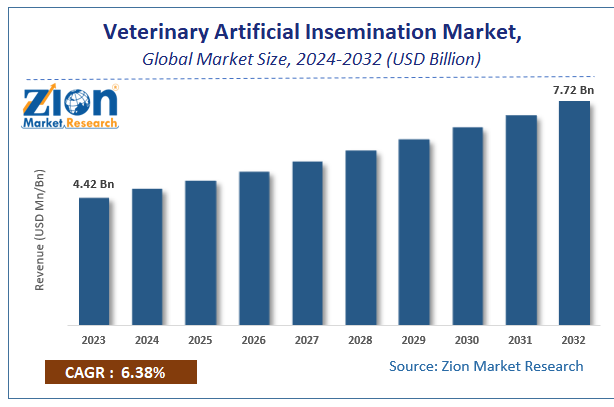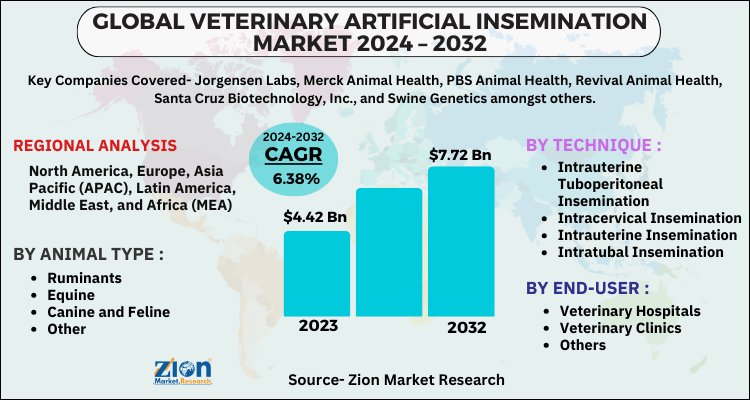Veterinary Artificial Insemination Market Size, Share Report [2032]

Veterinary Artificial Insemination Market By Animal Type (Ruminants, Equine, Canine and Feline and Other), By Technique (Intrauterine Tuboperitoneal Insemination, Intracervical Insemination, Intrauterine Insemination, and Intratubal Insemination), By End user (Veterinary Hospitals, Veterinary Clinics and Others), and By Region - Global Industry Perspective Comprehensive Analysis and Forecast, 2024 - 2032
| Market Size in 2023 | Market Forecast in 2032 | CAGR (in %) | Base Year |
|---|---|---|---|
| USD 4.42 Billion | USD 7.72 Billion | 6.38% | 2023 |
Veterinary Artificial Insemination Market: Industry Perspective
The global veterinary artificial insemination market size was worth around USD 4.42 Billion in 2023 and is predicted to grow to around USD 7.72 Billion by 2032 with a compound annual growth rate (CAGR) of roughly 6.38% between 2024 and 2032. The report analyzes the global veterinary artificial insemination market's drivers, restraints/challenges, and the effect they have on the demands during the projection period. In addition, the report explores emerging opportunities in the veterinary artificial insemination industry.
Veterinary Artificial Insemination Market Market: Overview
Artificial insemination is a method of manually inserting semen into the reproductive tract of women without natural mating. Artificial Insemination is one of the great techniques of biotechnology used to improve farm animals' reproduction and genetics.
In addition, a growing understanding of sexually transmitted diseases in animals to prevent STDs AI is being used in livestock, increasing technological advances, increasing reliability in protecting endangered species and increasing the protection of their habitats is driving the global market for Veterinary Artificial Insemination.
Veterinary Artificial Insemination Market Market: Segmentation Analysis
The study provides a decisive view of the Veterinary Artificial Insemination market by segmenting the market based on Animal Type, Technique, End-user and region. All the segments have been analyzed based on present and future trends and the market is estimated from 2024 to 2032.
Based on Animal Type, the market is segmented into Ruminants, Equine, Canine and Feline and Others. Based on animal type, the ruminant segment in the veterinary artificial insemination market held the largest share in 2023. This share can be attributed to various factors, such as the large consumer base of cattle meat & milk products and the increasing acceptance of advanced genetic research to improve livestock productivity. In addition, environmental conditions and the risk of extinction are key issues faced by the breeding of animals. As the conditions of agriculture and the needs of farmers change, many of the breeds are no longer suitable for most farms. AI can be best used as a tool of reproduction, enabling even extinct breeds to begin in situ breeding.
Based on the Technique segment, the market is bifurcated Intrauterine Tuboperitoneal Insemination, Intracervical Insemination, Intrauterine Insemination, and Intratubal Insemination.
Based on the End user segment, the market is bifurcated into Veterinary Hospitals, Veterinary Clinics and Others. The veterinary hospital's group held the highest market share in 2023. This can be attributed to the increasing adoption by farm owners of genomic tests to avoid financial losses and loss of animal productivity. More than 90% of U.S. veterinary hospitals offered insemination services in 2023, according to the American Veterinary Medical Association.
Veterinary Artificial Insemination Market Market: Regional Analysis
The geographical segmentation comprises the current and forecast demand for North America, Europe, Asia Pacific, Latin America, and Middle East & Africa. The largest cattle population in Asia Pacific accounted for a major share in 2023. The number of commercialized semen doses rose from over 7 million in 2003 to over 14 million in 2017, according to the Brazilian Association of Artificial Insemination (BAAI). India and China have over 30% of the world's cattle population.
As a result of increased awareness and environmental concerns, Europe is seeing an increase in the adoption of AI techniques for cattle-producing milk. In 2018, a majority of the population switched to a vegan diet when WHO reported a higher risk of developing cancer on a meat diet. This increased the need for milk and its products to meet the requirements of protein & calcium, creating new avenues for regional market growth.
Veterinary Artificial Insemination Market: Report Scope
| Report Attributes | Report Details |
|---|---|
| Report Name | Veterinary Artificial Insemination Market |
| Market Size in 2023 | USD 4.42 Billion |
| Market Forecast in 2032 | USD 7.72 Billion |
| Growth Rate | CAGR of 6.38% |
| Number of Pages | 230 |
| Key Companies Covered | Jorgensen Labs, Merck Animal Health, PBS Animal Health, Revival Animal Health, Santa Cruz Biotechnology, Inc., and Swine Genetics amongst others |
| Segments Covered | By Animal Type, By Technique, By End-user and By Region |
| Regions Covered | North America, Europe, Asia Pacific (APAC), Latin America, Middle East, and Africa (MEA) |
| Base Year | 2023 |
| Historical Year | 2018 to 2022 |
| Forecast Year | 2024 - 2032 |
| Customization Scope | Avail customized purchase options to meet your exact research needs. Request For Customization |
Veterinary Artificial Insemination Market: Dynamics
Increasing adoption of semen sexing technology across beef and dairy herds is anticipated to boost market growth due to the associated benefit of focused selection of breeding animals to develop a stronger next generation. Genus ABS, one of the leading players in the market, strongly rebounded in 2018 after Sexcel's successful launch in 2017. Sales of the company increased in 2018 after the launch to nearly 25%, representing high demand and adoption in developed countries. With the technique becoming increasingly popular, many producers are collecting semen from top herd sires and making it available to other producers. The method also offers farmers the ability to choose from their animals what characteristics they want to breed. This validated and better-developed methodology is becoming increasingly available worldwide.
AI will be growing many animal breeding-related threats, such as the transmission of disease, which is a major driver of market growth. It is known that the whole AI process is much more hygienic than natural mating. In addition, as the conditions of agriculture and the needs of farmers change, most animal breeds are no longer suitable for most farms. Nevertheless, artificial insemination with the desired traits can be used to generate progenies.
Veterinary Artificial Insemination Market: Competitive Analysis
Some of the major players in the global veterinary artificial insemination market include:
- Jorgensen Labs
- Merck Animal Health
- PBS Animal Health
- Revival Animal Health
- Santa Cruz Biotechnology, Inc.
- Swine Genetics
The global veterinary artificial insemination market is segmented as follows;
Global Veterinary Artificial Insemination Market: Animal Type Segment Analysis
- Ruminants
- Equine
- Canine and Feline
- Other
Global Veterinary Artificial Insemination Market: Technique Segment Analysis
- Intrauterine Tuboperitoneal Insemination
- Intracervical Insemination
- Intrauterine Insemination
- Intratubal Insemination
Global Veterinary Artificial Insemination Market: End-User Segment Analysis
- Veterinary Hospitals
- Veterinary Clinics
- Others
Global Veterinary Artificial Insemination Market: Regional Segment Analysis
- North America
- U.S.
- Europe
- UK
- France
- Germany
- Asia Pacific
- China
- Japan
- India
- Latin America
- Brazil
- Middle East and Africa
Table Of Content
Methodology
FrequentlyAsked Questions
Veterinary Artificial Insemination (VAI) is a reproductive technology involving the collection of sperm from a male animal and its subsequent introduction into the reproductive tract of a female to achieve pregnancy. This process bypasses natural mating, allowing for controlled breeding and genetic improvement. VAI has become a standard practice in livestock production, particularly in dairy and beef cattle, but is also used in other species like horses, pigs, and sheep.
According to a study, the global veterinary artificial insemination market size was worth around USD 4.42 billion in 2023 and is expected to reach USD 7.72 billion by 2032.
The global veterinary artificial insemination market is expected to grow at a CAGR of 6.38% during the forecast period.
Asia Pacific is expected to dominate the veterinary artificial insemination market over the forecast period.
Leading players in the global veterinary artificial insemination market include Jorgensen Labs, Merck Animal Health, PBS Animal Health, Revival Animal Health, Santa Cruz Biotechnology, Inc. and Swine Genetics, among others.
Choose License Type
RelatedNews
HappyClients
Zion Market Research
Tel: +1 (302) 444-0166
USA/Canada Toll Free No.+1 (855) 465-4651
3rd Floor,
Mrunal Paradise, Opp Maharaja Hotel,
Pimple Gurav, Pune 411061,
Maharashtra, India
Phone No +91 7768 006 007, +91 7768 006 008
US OFFICE NO +1 (302) 444-0166
US/CAN TOLL FREE +1 (855) 465-4651
Email: sales@zionmarketresearch.com
We have secured system to process your transaction.
Our support available to help you 24 hours a day, five days a week.
Monday - Friday: 9AM - 6PM
Saturday - Sunday: Closed







